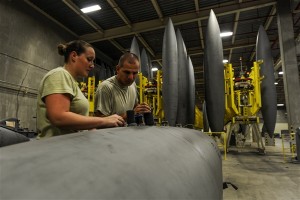OKINAWA, Japan, Aug. 6, 2015 – Kadena Air Base is home to an array of aircraft designed to perform a variety of missions -- from cargo transportation to air superiority -- but none of those missions are accomplished without the support of ground crew. Air Force Staff Sgt. Thomas Lewellen, an aircraft fuel systems craftsman with 18th Component Maintenance Squadron, and Air Force Senior Airman Elizabeth Melton, a fuel systems journeyman with 18th CMS, inspect an external fuel tank at Kadena Air Base, Japan, Aug. 4, 2015. Lewellen is Melton’s supervisor. U.S. Air Force photo by Airman 1st Class Lynette Rolen
Air Force Staff Sgt. Thomas Lewellen, an aircraft fuel systems craftsman with 18th Component Maintenance Squadron, and Air Force Senior Airman Elizabeth Melton, a fuel systems journeyman with 18th CMS, inspect an external fuel tank at Kadena Air Base, Japan, Aug. 4, 2015. Lewellen is Melton’s supervisor. U.S. Air Force photo by Airman 1st Class Lynette Rolen
That support includes airmen from the 18th Component Maintenance Squadron, like Air Force Staff Sgt. Thomas Lewellen. He and his fellow fuel systems experts help ensure the jets take to the sky. "To work on an aircraft, especially an aircraft that you know is going to do a mission … and then see a pilot instantly step into it and take off -- to make the mission happen, that is absolutely the best," Lewellen said.
Fast Learner Lewellen has worked on aircraft throughout his nine years in the Air Force -- mostly F-15 Eagles, but plenty of others, too. When new aircraft were added to his shop, his superiors noticed how quickly Lewellen adapted. "Within one day of a training course, he was already out on a KC-135 [Stratotanker] and was troubleshooting," said Tech. Sgt. Daniel Little, an assistant section chief at the 18th CMS aircraft fuel systems repair facility, who said he has known Lewellen for just over one year. "He’s the tip of the spear." Noncommissioned officers, though, aren't just charged with mastering their technical jobs. As leaders, it’s imperative they impart their knowledge to the next generation. That's a skill in which Lewellen takes pride. "I’m a firm believer in actually leading, showing them how to do it, leading them through it, and then letting them show you what they have done the next time the task needs to happen," Lewellen said. "Just telling them to do something would be supervising or managing -- not leading."
Value of Approachability As his airmen complete their tasks, Lewellen said he provides them with feedback. He said he believes in using positive feedback in order to keep up their morale and in maintaining an interest in the overall well-being of his airmen. He also said he wants to be approachable about issues not related to the shop environment. "I’ve never had a supervisor who asked me every single day how I’m doing," said Senior Airman Elizabeth Melton, a fuels systems journeyman with the 18th CMS. "He lets me know that it’s an open-door policy and that if I ever have a problem, I know that I can go to him. I know that it’s okay to tell him if anything’s wrong. I know he’ll help me if I need to be helped."
Career Mentorship In addition to his concern about the success of his airmen’s personal lives, Lewellen said he cares about their professional success, too. He encourages his airmen to try their best at progressing in their careers. "It makes me feel better whenever I can take a brand-new airman out of [technical] school and mold them and then later … see them doing great things," Lewellen said. "Quarterly awards, annual awards, below-the-zone [promotion] -- it’s not only rewarding for them, but it’s rewarding for a supervisor also, because you help that process." Lewellen said he's worked with Melton for four years and recently became her boss. She said he sets an example for what it means to be a great supervisor. "He wants to see you succeed and vice-versa. When we succeed, he succeeds," Melton said. "He’s just a great all-around supervisor –- one of the best I’ve ever had, definitely. He is a rock star."
Written August 6, 2015 By: Air Force Airman 1st Class Lynette Role. DoD News, Defense Media Activity.
Republished and redistributed by SOT by permission of DOD.


